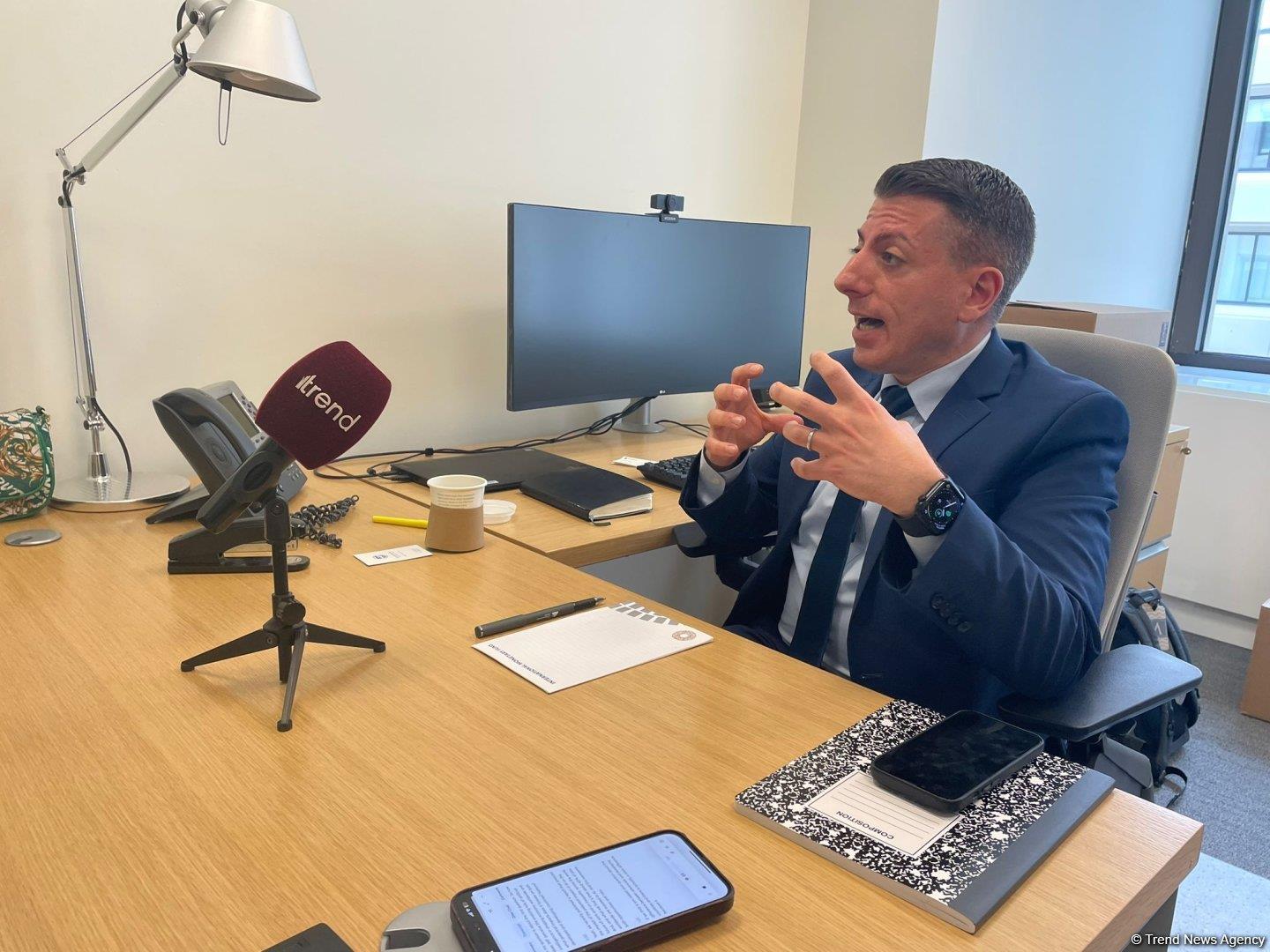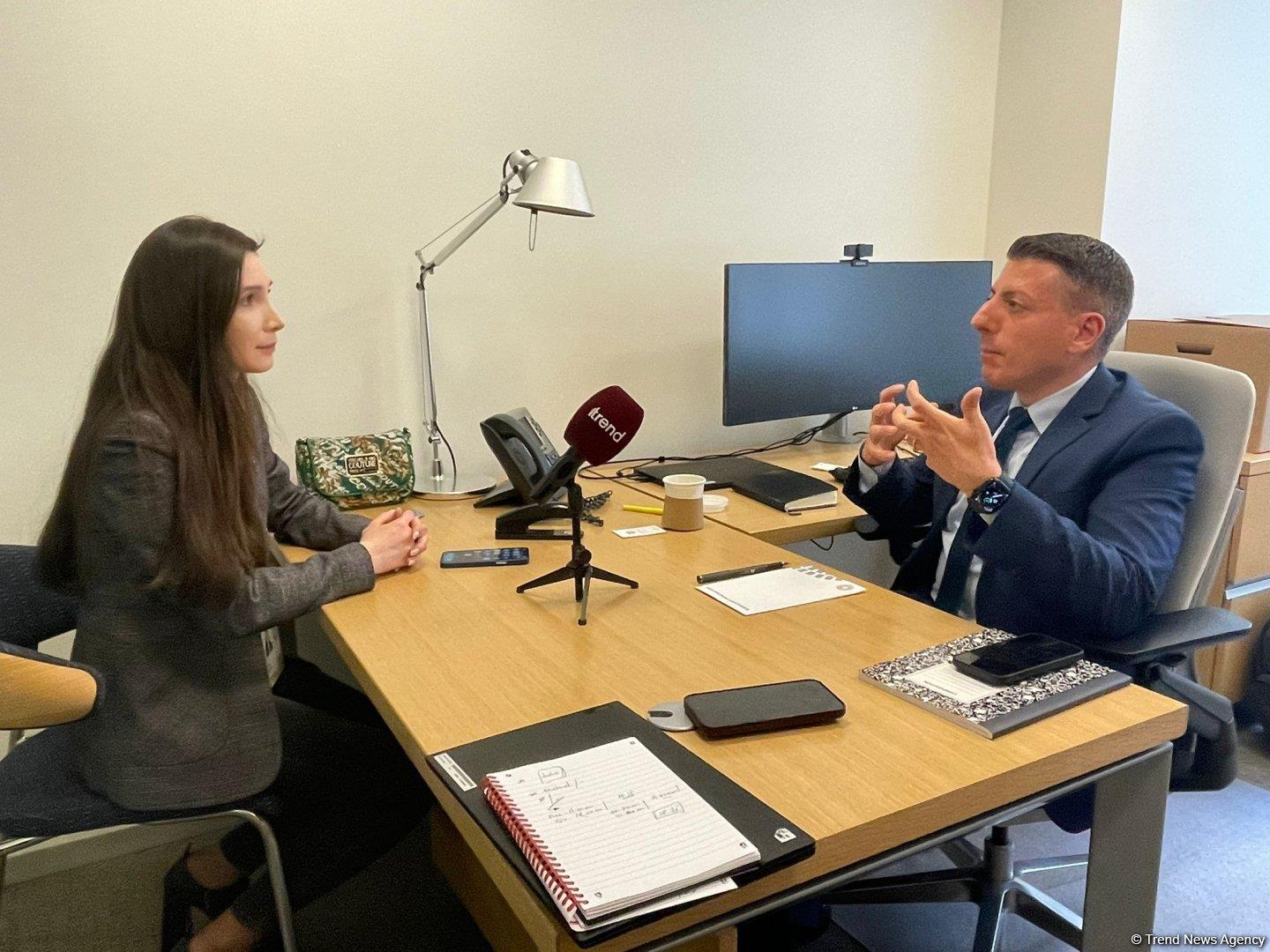(MENAFN- Trend News Agency) WASHINGTON, U.S., April 23. The effects ofartificial intelligence are likely going to be unequal also withincountries, Giovanni Melina, Deputy Division Chief in the ResearchDepartment of the International Monetary Fund (IMF), said in anexclusive interview with Trend on the sidelines of the IMF Spring Meetings heldfrom April 15 to April 20 in Washington D.C.
He pointed out that about 40 percent of jobs worldwide areexposed to AI and this represents both opportunities and risks.
“There is actually a stark difference between advanced anddeveloping countries, because exposure in advanced economies isabout 60 percent while in emerging market economies falls to 40percent. And this implies that on one hand for advanced economiesthey face more immediate risks from artificial intelligence, but atthe same time they are better prepared to harness the benefits fromAI, while emerging and developing countries may not face immediaterisks to the same extent, but at the same time they may also findit more difficult to harness the benefits from AI,” notedMelina.
He went on to add that IMF is actively engaging with membercountries to harness the benefits of artificial intelligence whilemitigating its potential risks to economic stability andinclusivity in two main ways.
“The first one is producing analysis, and our recent report isone example of the analysis we are producing. We use this analysisalso to provide country specific advice. Also convening authoritiesfrom many member countries and fostering a debate on the issue isalso a very important function of the IMF. For example, there's wasthe global debate of our managing director and the main topic ofthe debate was on AI, and both country officials and academics wereinvited to discuss about AI in this debate. So, it really offersopportunities both for member countries and for us to learn fromtheir experience,” said Melina.
He pointed out that as part of its analysis IMF has developed anindex called the AI preparedness index, and this index evaluateshow ready countries are to adopt artificial intelligence.
“And there are several dimensions of this index that look at thedigital infrastructure and the presence of appropriate skills touse AI in the economy, labor market policies, the ability toinnovate or to absorb new technologies from abroad, and theregulatory framework. For example, whether there is a governanceframework in place to leverage technologies, but at the same timein a way that is safe for citizens and for it to be used in anethical way. And when we look at this index, what we find is thatgenerally advanced economies score very high when it comes tofoundational infrastructure; having the digital infrastructure inplace, having the human capital in place, while in many emergingand developing countries this is still not the case,” saidMelina.
He noted that this gives also some suggestions on policypriorities.
“In advanced economies, the focus should be more on improvingthe regulatory framework in fostering the safe adoption of AI andhaving the right social safety nets in place, while for developingcountries, many of them have to invest in providing the digitalinfrastructure and the digital skills to be able to use thetechnology. This doesn't mean that, for example, the regulatoryframework is not important in developing countries. It is stillvery important. But having a good regulatory framework in place,without having, for example, access to internet or a sufficientnumber of computers in the economy, would not foster the adoptionof the technology,” said Melina.
He went on to add that the mandate of the IMF is to mainly focuson economic and financial risks and opportunities.
“So obviously this new technology offers an immense potential toincrease productivity, and to lift incomes around the world, but atthe same time, it poses risks for inequality, for employment, forfinancial stability. And these are all central policy issues thatthe IMF has been very interested in for a very long time. When itcomes to these risks, the role of the IMF is to produce analysisand to provide tailored advice to mitigate them,” said Melina.
He believes that the main focus should be on policies that areas much as possible inclusive.
“For example, increasing safety nets. In our report, we findthat the effects of artificial intelligence are likely going to beunequal also within countries. For example, we have young, moreeducated workers that are much more likely to be able to transitionto jobs where artificial intelligence is complementary to humanlabour. While for older workers this is more difficult. So, thereshould be both labor market policies that facilitate thistransition, but also safety nets that take care of those people whofind it more difficult to adapt to this technological change.
The impact of artificial intelligence from the macroeconomicviewpoint is currently very uncertain. Because on one hand, thereare potentially big productivity gains and also, but studiesavailable right now are very heterogeneous in predicting the impacton productivity. At the same time, there are risks that need to betaken into account. So, our role is to provide advice on policiesthat may shelter countries from these risks and to maximize thepotential benefits,” Giovanni Melina concluded.
Follow the author on X: @Lyaman_Zeyn






MENAFN26042024000187011040ID1108141689
Legal Disclaimer:
MENAFN provides the information “as is” without warranty of any kind. We do not accept any responsibility or liability for the accuracy, content, images, videos, licenses, completeness, legality, or reliability of the information contained in this article. If you have any complaints or copyright issues related to this article, kindly contact the provider above.